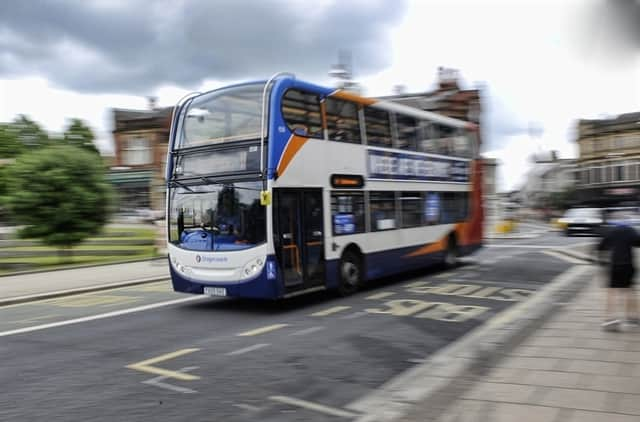Public ownership of buses to be considered following review


The findings of the South Yorkshire Bus Review chaired and compiled by Sheffield South East MP Clive Betts, has found a raft of shocking failings throughout the county’s public transport network.
Recommendations show Sheffield City Region bosses should procure the necessary expertise to "financially and legally investigate" the process of franchising right away.
Advertisement
Advertisement
But the possibility of creating a municipal bus company – owned and run by the Sheffield City Region – should come no more than five years after the creation of a new South Yorkshire-wide Enhanced Partnership.
Franchising should be considered after around three years by June 2023.
Sheffield Council was the most in favour of taking services back into public ownership or in the way of a franchise model. Barnsley Council was said to be the most against it with Rotherham and Doncaster sitting somewhere in between.
The panel said in a 100 plus page report there was a ‘lack of leadership’ from the bus operators, South Yorkshire Passenger Transport Executive (SYPTE), councils and from the Sheffield City Region.
Advertisement
Advertisement
Mr Betts concluded there are "too many layers of leadership" without the "leverage and power" to bring about real change.
The painful delay in getting a devolution deal over the line was also said to be a reason why SCR mayor Dan Jarvis "couldn’t take more of a lead".
SYPTE was found to have nOt been allowing councils to make decisions about bus services but in turn local authority leaders have "shied away from responsibility".
The body will also be scrapped and merged with the SCR executive team under the reccomendations.
Advertisement
Advertisement
Commissioners observed the bus transport leadership in South Yorkshire is "weak" and there is a "lack of ownership taken" for improving bus services.
The review found that there is a "lack of accountability"’ held by SYPTE in monitoring the contracts it administers for tendered bus services.
The commissioners also said the body "does not hold operators to account" for delivering quality services and maintaining partnership agreements such as frequency of service changes.
The report said funding for the bus network in South Yorkshire is "woefully inadequate".
Advertisement
Advertisement
Central Government funding for bus transport is "not sufficient and not fairly distributed across the country".
Campaign for Better Transport estimated that, in real terms, funding for bus services in England has fallen by over £162m or 43 per cent since 2009/10. This figure is said to resonate with South Yorkshire, where SYPTE’s budget has declined by 40 per cent in real terms over the same period, with a 39 per cent cut in funding for support services during this time.
Despite this, the four local authorities stated that "no additional investment would be made" from current budget allocations.
While commissioners said they were sympathetic to the impact of continuous local government funding cuts, the review found that having an arms-length body (SYPTE) has let local authorities "avoid making decisions about bus services and has allowed them to shy away from responsibility".
Advertisement
Advertisement
In response, SYPTE Executive Director, Stephen Edwards, said: "The Bus Review highlights how vital a strong, reliable, interconnected bus network is for the people of South Yorkshire, and the challenges there have been in delivering this in recent years. We welcome the report's recognition that more investment, robust leadership, greater accountability and firm commitment is needed, to secure a sustainable and thriving bus network that is responsive to customer needs.
"It is no secret that successive years of public transport funding cuts has had a negative impact on the bus network and its customers. We recognise that we have not always been able to get things right. The tough financial environment, and legislative framework, in which we have had to operate, has limited SYPTE's ability to protect or improve services.
"We know that fundamental change is needed to address bus decline and the review recommendations offer an opportunity to shape a better, more integrated bus network for the future."
SYPTE said it did not wish to add anything further when asked to respond to the Commissioners' calls to dissolve the organisation.
Advertisement
Advertisement
Stagecoach Yorkshire MD, Phil Medlicott, welcomed the review and supported its calls for targeted funding and other measures to address car congestion and make bus services faster and more reliable.
But added: "Delivering these practical improvements and priorities will give the region the bus network communities need without the unnecessary diversion of resources on franchisig or municipal bus ownership. Neither of these routes will change the economics of running services or make them more attractive and would put even greater strain on the region's taxpayers who already face paying a huge price for the measures which have been necessary to tackle Covid-19."